In collaboration with
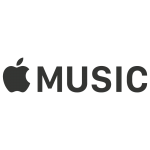
- Words Aimee Phillips
- Photography Obidi Nzeribe
- Styling Corey Stokes
- Grooming Juanita Matijasevic
Get to know R&B singer-songwriter Givēon, the Apple Music Up Next artist with the breathtaking baritone voice.
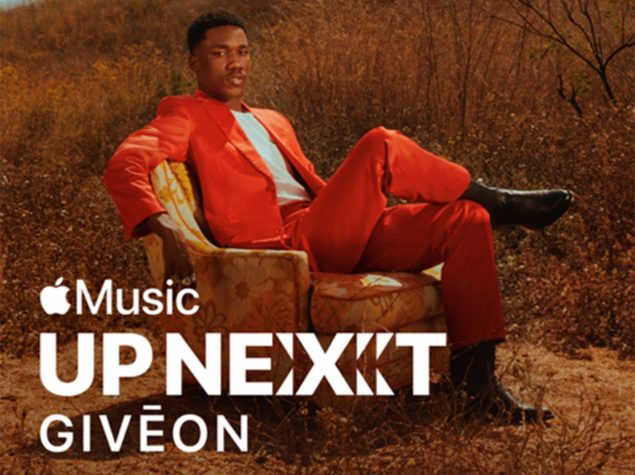
With his deep, delicious vocals, heartbreaking lyricism and R&B melodies, it’s no wonder Long Beach singer-songwriter Givēon is making an impact.
The emerging artist may not yet be a household name, but after being selected as Apple Music’s Up Next artist for October, he soon will be.
Racking up tens of millions of streams is no biggie for this softly spoken young star, but while Givēon may seem gifted with a God-given talent, it took him a long time to realise his power. “At first, I wasn’t a fan at all”, he tells Notion. “There wasn’t any representation for my type of voice. I had to go and discover and I stumbled across the era of swing jazz and baritone singers”.
“You just have to really learn to love what you do, and not really care about outside perspective”
On his new EP, ‘When It’s All Said And Done’, Givēon further demonstrates his ability to grace a falsetto whilst also captivating more hearts with the rich, treacle-y vocals his fans have come to love. His innate skill for storytelling is clear on the release, as Givēon deftly navigates the end of a relationship. On closing track “Stuck On You”, Givēon ponders: “Maybe I’m the one to blame / Maybe I’m the cause of the pain / Waiting for you, even how you treat me / You’re my baby even when you leave me / Maybe I’m the problem and the one that’s causing all of this”.
Released at the start of October, ‘When It’s All Said And Done’ immediately became #1 on Apple Music’s top R&B albums chart in 7 countries – a true reflection of Givēon’s unique yet entrancing vocals and emotive narrative. It makes the EP the perfect follow-up to the musician’s ‘Take Time’ EP, which became one of the most critically acclaimed R&B projects of the year. No wonder Drake snapped him up to feature on his song “Chicago Freestyle”.
We caught up with Givēon over Zoom to talk about his journey into music, the best and worst parts of being an artist, and what we can expect next from him.
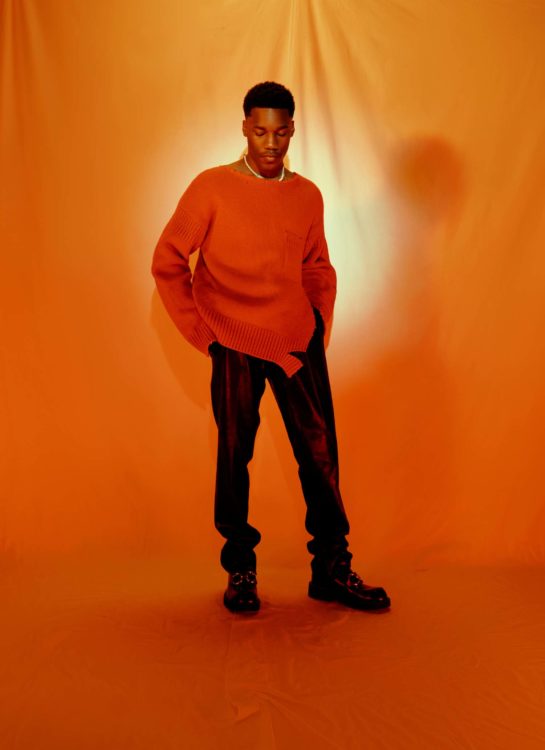
- Jumper and shoes Marni
- Trousers Vintage Dior Homme @ Artifact New York
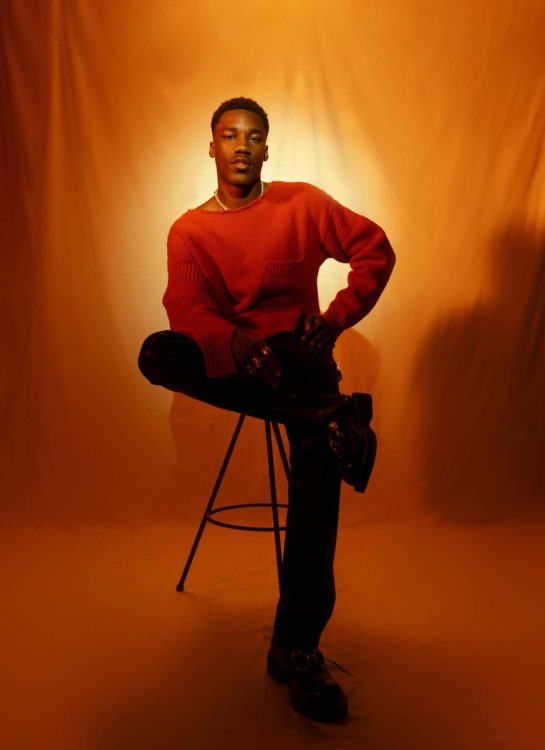
First of all, how are you? How have the past few months been for you? Has lockdown impacted your creative process?
It’s been weird, honestly. But I’ve got to find the silver lining in all the chaos. I found that I was forced to be more creative, and also more independent creatively. Because while there’s technology to help you connect with other producers or writers, the soul of the creative process gets lost. So I was like, I’m gonna try to take it all in and do it alone. I found that I kind of prefer that way now. So the whole pandemic forced me to just elevate and accelerate my own development process.
What to you is the most beautiful and exhilarating part of being an artist?
I feel like my diary comes to life because I get to put music to it and videos and colours and all this stuff. I just get to like, share my diary and just put it on music. That’s what I think. That’s my favourite part.
What’s the hardest part?
I’d say the hardest part – at least doing it on this level where there’s a lot of eyeballs and numbers and stats – is just making sure you keep the mindset that you can’t please everyone. Especially for me, my voice isn’t a traditional sound and tone of voice. So I just have to get in the mindset that people won’t like it no matter how good I feel that it is. If my tone of voice hits someone’s ears weird, no matter what I do, they won’t like it. So you just have to really learn to love what you do, and not really care about outside perspective.
But you have a beautifully unique voice. It’s so smooth, like butter. You’ve said that in the past that you didn’t like it, though. What led you to embrace your singing voice?
At first, I wasn’t a fan at all. And I think that comes with having something and not enjoying it; it’s even like having my skin tone and watching TV and not seeing anyone like me – that would create a sense of insecurity too. So I thought there wasn’t any representation for my type of voice. I had to go and discover and I stumbled across the era of swing jazz and baritone singers. Frank Sinatra was the first one that I discovered. So once I saw that representation of my voice, that’s when I began to gain a lot of confidence and just accept it.
You’ve said that you fell in love with songwriting before you fell in love with singing. Can you tell me that story?
So I’ve always just been a fan of writing stories, it wasn’t even music at first, I’ve always just been a writer. I would write these stories and want to get people’s opinions on it, but no one really wanted to hear all that at that time because the stories I was writing were like, 30-40 pages long. So I was like, I’m never gonna get any feedback. So I was thinking, how can I condense the story to where people will want to hear it? And then I got to poetry. I don’t know if my attention span was too short but poetry just wasn’t for me. So I thought, what if I add music behind it and turn it into a song? So that’s how the writing process started, and then I narrowed down to a three-minute song. So I wouldn’t even say all songwriting at first, it was just writing and then turning it into music.
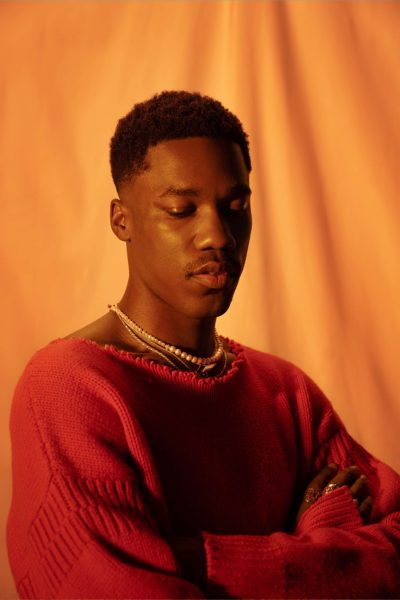
Because you’re such a big writer, are you also a really avid reader?
You know, it’s crazy but I think that’s why I didn’t get into poetry because I don’t like reading. My favourite way to take a story in is visually, like movie series and stuff like that. I don’t know why. I’ll be reading a line and then my mind will be somewhere else. I can never get into reading. So I think that’s what turned me off poetry. I just don’t have the attention span to read, I guess.
So you said you’re into movies and TV series – are there any in particular that inspire you?
The way I base it, I don’t take [my inspiration] from one exact film. But I do take the overall feel of it. So just the overall storytelling, a beginning, middle, and end. It’s harder to do that with one song, so I try to apply it to the overall body of work. If I have an EP coming or album coming, I try to apply a film aesthetic to the overall work. And character development as much as I can within the 3-4 minutes. If you listen to some of my work, at the beginning of a project, there’s a certain vibe, and then you get the character dynamic shifting as the project goes on. I try to approach the whole aspect as a body of work.
What are some of your earliest memories of music? What did you listen to growing up? Did your family’s taste influence yours?
Oh, yeah. thousand per cent. So my first memory of music is my Mum cleaning around the house and just throwing on some music while she cleans, like Anita Baker and Mary J. Blige and stuff like that. And I tell her all the time, the only reason I started singing those songs was that she played the same five songs over and over. It’s not like she was like, she had like a bunch of albums. She was just playing the same exact song. So eventually I memorised the words. And I just started singing along and she noticed that I was singing along. A common theme in those songs was heartbreak. And now I see a lot of that and my songs now.
What can we expect next from Giveon?
You can expect more stories, more honest stories, relatable stories, and just more growth as an artist, and as a person. Expect more music and more of an evolution as well. Not just the same static sound.

